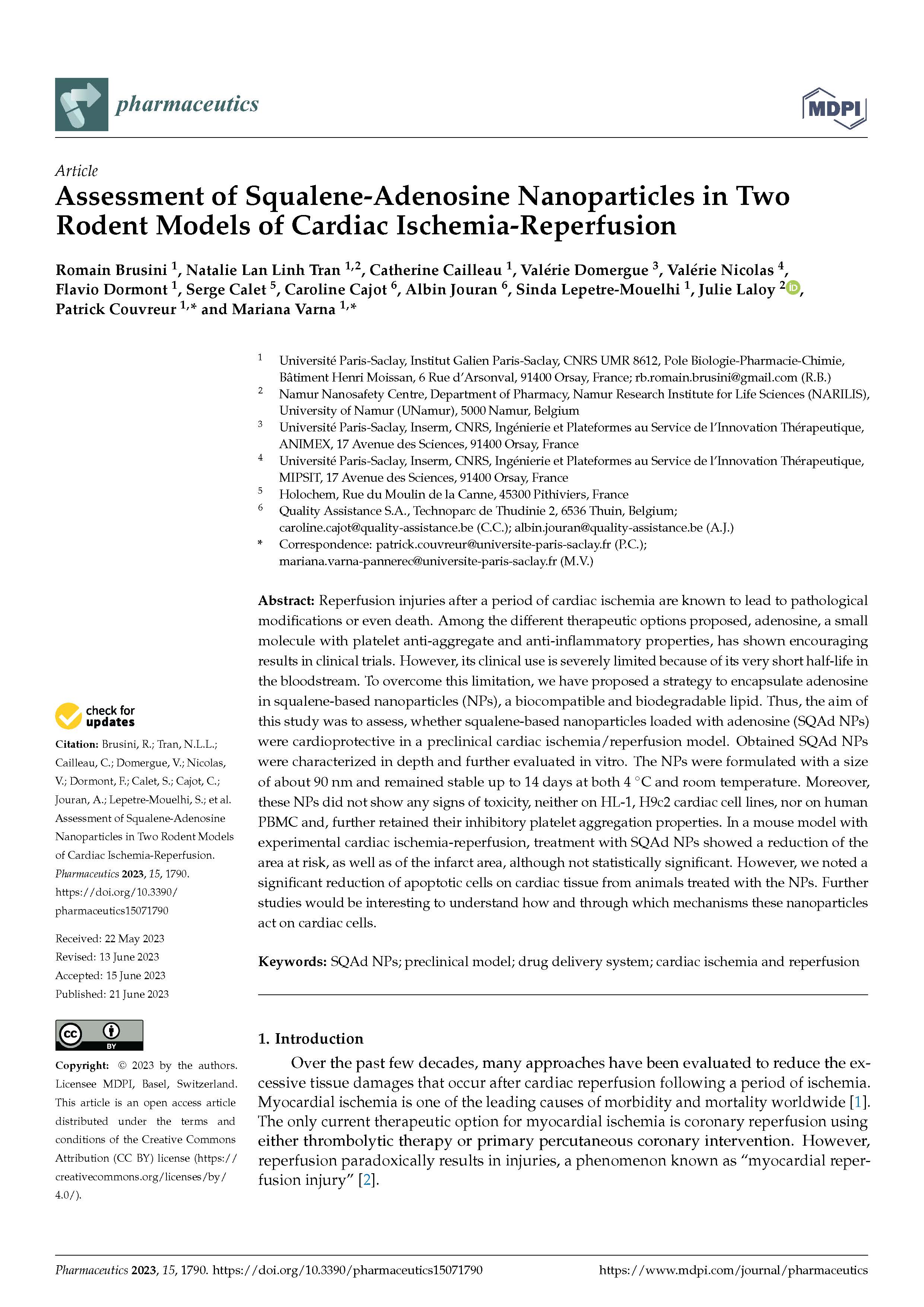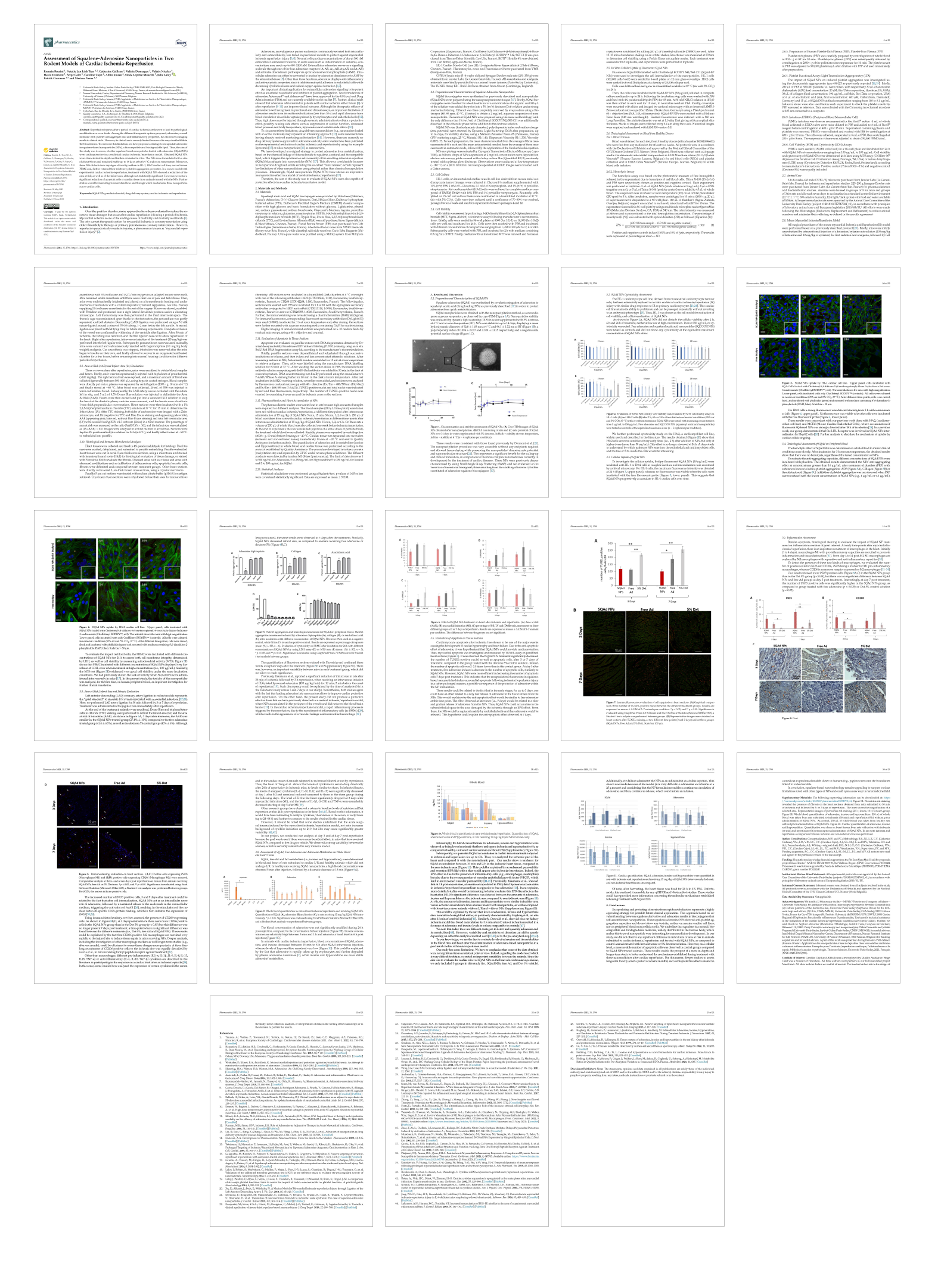Assessment of Squalene-Adenosine Nanoparticles in Two Rodent Models of Cardiac Ischemia-Reperfusion

(1) Université Paris-Saclay, Institut Galien Paris-Saclay, CNRS UMR 8612, Pole Biologie-Pharmacie-Chimie, Bâtiment Henri Moissan, 6 Rue d’Arsonval, 91400 Orsay, France; rb.romain.brusini@gmail.com (R.B.)
(2) Namur Nanosafety Centre, Department of Pharmacy, Namur Research Institute for Life Sciences (NARILIS), University of Namur (UNamur), 5000 Namur, Belgium
(3) Université Paris-Saclay, Inserm, CNRS, Ingénierie et Plateformes au Service de l’Innovation Thérapeutique, ANIMEX, 17 Avenue des Sciences, 91400 Orsay, France
(4) Université Paris-Saclay, Inserm, CNRS, Ingénierie et Plateformes au Service de l’Innovation Thérapeutique, MIPSIT, 17 Avenue des Sciences, 91400 Orsay, France
(5) Holochem, Rue du Moulin de la Canne, 45300 Pithiviers, France
(6) Quality Assistance S.A., Technoparc de Thudinie 2, 6536 Thuin, Belgium; caroline.cajot@quality-assistance.be (C.C.); albin.jouran@quality-assistance.be (A.J.)
* Correspondence: patrick.couvreur@universite-paris-saclay.fr (P.C.); mariana.varna-pannerec@universite-paris-saclay.fr (M.V.).
DOWNLOAD THE ARTICLE BELOW 🔽
Abstract
Reperfusion injuries after a period of cardiac ischemia are known to lead to pathological modifications or even death. Among the different therapeutic options proposed, adenosine, a small molecule with platelet anti-aggregate and anti-inflammatory properties, has shown encouraging results in clinical trials. However, its clinical use is severely limited because of its very short half-life in the bloodstream. To overcome this limitation, we have proposed a strategy to encapsulate adenosine in squalene-based nanoparticles (NPs), a biocompatible and biodegradable lipid.
Thus, the aim of this study was to assess, whether squalene-based nanoparticles loaded with adenosine (SQAd NPs) were cardioprotective in a preclinical cardiac ischemia/reperfusion model. Obtained SQAd NPs were characterized in depth and further evaluated in vitro. The NPs were formulated with a size of about 90 nm and remained stable up to 14 days at both 4°C and room temperature. Moreover, these NPs did not show any signs of toxicity, neither on HL-1, H9c2 cardiac cell lines, nor on human PBMC and, further retained their inhibitory platelet aggregation properties. In a mouse model with experimental cardiac ischemia-reperfusion, treatment with SQAd NPs showed a reduction of the area at risk, as well as of the infarct area, although not statistically significant. However, we noted a significant reduction of apoptotic cells on cardiac tissue from animals treated with the NPs. Further studies would be interesting to understand how and through which mechanisms these nanoparticles act on cardiac cells.
Click here to access our latest publication in Pharmaceutics MDPI

Contact us to discuss this article